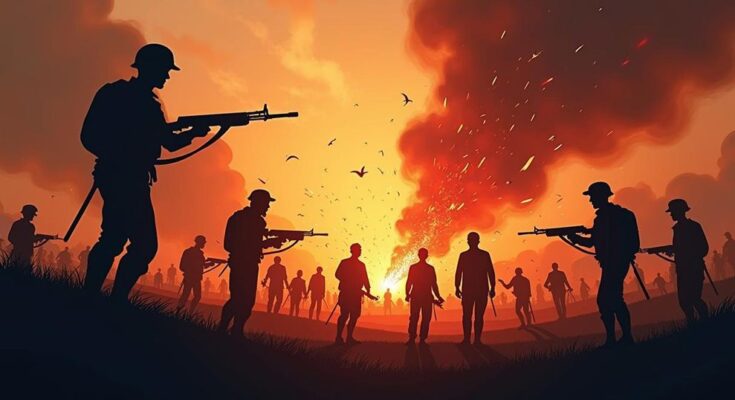Israel and Iran find themselves on the brink of a catastrophic war following a significant missile attack by Iran targeting various Israeli military bases. While most missiles were intercepted, the incident marks a dangerous escalation in hostilities, with both nations now likely to pursue aggressive military stances despite the risk of broader regional conflict. The lack of effective communication underscores the urgent need for diplomatic engagement to prevent a spiral of violence that could result in disastrous consequences for both countries.
The ongoing tensions between Israel and Iran have escalated dramatically following a series of missile attacks. Iran’s Revolutionary Guard Corps and military launched approximately 180 missiles at Israel, targeting key military installations in an act of retaliation for the recent assassinations of prominent Hezbollah and Hamas leaders. While many missiles were intercepted through collaboration with U.S. and Jordanian forces, several still struck military and civilian areas, resulting in minor casualties and limited damage. This confrontation signifies a perilous trajectory toward a direct war, which could have profound implications for the entire Middle East and potentially extend its impact beyond the region. It is essential to approach this escalating conflict with caution; hasty decisions could exacerbate the situation. Unlike earlier attacks, this latest offensive was characterized by its speed and the volume of missiles deployed, reflecting Iran’s concerns about its influence in the region and its perceived retreat from supporting allies like Hezbollah. There is a palpable urgency in Tehran to respond decisively to the threat posed by Israel, which is perceived as a direct challenge to Iranian credibility both regionally and domestically. Israel is reportedly preparing a more robust military response to Iran’s recent actions, focusing on disrupting Iran’s military capacities and possibly targeting critical installations, including missile bases, anti-aircraft systems, and potentially the energy sector. The Israeli government is also considering preemptive strikes against Iran’s nuclear capabilities, although such actions are complicated by international dynamics, particularly the Biden administration’s stance towards Iran’s nuclear program. The Israeli public discourse has shifted to more aggressive postures as fears relating to Iranian nuclear advancements grow, intensified by perceived weakness within Hezbollah and calls for more decisive leadership following recent conflicts. Voices advocating for a firm Israeli response are increasingly prominent in light of the increased hostilities. The consequences of continued aggression between Iran and Israel are dire. A persistent cycle of attacks and responses could ultimately drive both nations towards a catastrophic conflict, with nuclear implications looming large. The absence of effective communication between the two nations necessitates a structured consultation process, mirroring the diplomatic efforts of past crises such as the Cuban missile crisis. In conclusion, as these tensions unfold, it becomes imperative that leaders in Israel and Iran reflect upon historical precedents before acting. Diplomacy and measured decision-making are crucial to avoiding a larger conflict that could irrevocably alter the regional and global landscape.
The dynamics between Israel and Iran are influenced by a complex web of historical grievances, regional power struggles, and geopolitical strategies. The recent hostilities mark a significant escalation in an ongoing conflict characterized by proxy wars, military provocations, and counter-strategies. Both nations view each other as existential threats; thus, military engagements could lead to broader confrontations with dire global implications. As nuclear proliferation concerns grow, particularly regarding Iran’s advancements in its nuclear program, the urgency for decisive yet diplomatic solutions is paramount. The lack of communication further complicates the situation, necessitating a careful approach to prevent miscalculations that could lead to catastrophic outcomes.
The current trajectory in Israeli-Iranian relations highlights the potential for a catastrophic conflict. Both nations appear to be escalating their military preparations and rhetoric, which could lead to direct confrontations with severe regional implications. To mitigate the risk, it is essential that leaders maintain open lines of communication and employ strategic, diplomatic measures reminiscent of past crises, ensuring that decisions are grounded in measured deliberation rather than swift retaliation. The lessons of history must guide today’s leaders toward responsible governance in times of escalating tensions.
Original Source: thehill.com




